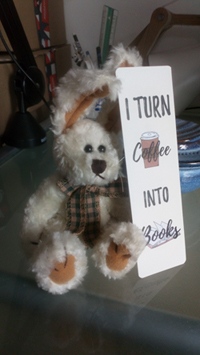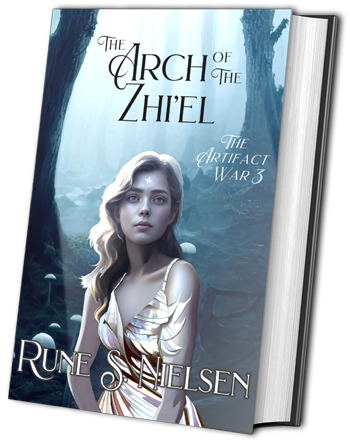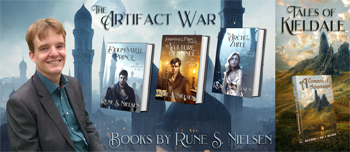 |
||||
 |
||||
 |
||||
 |
|||
 |
|||
 |
||||
 |
||||
Interview with Rune S. Nielsen
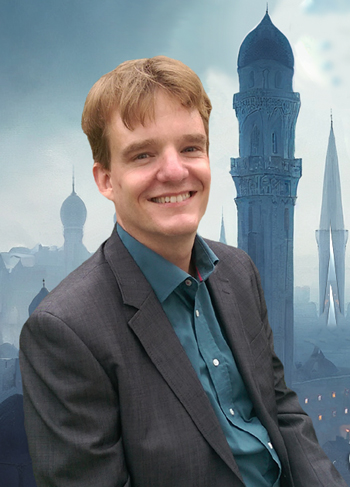
Bio
Hi, I'm Rune S. Nielsen and I write epic fantasy stories. I live in Denmark. More specifically, in Copenhagen in a big old house near a number of small lakes. I take walks there most days and sometimes find things to draw which I use as illustrations in my books.
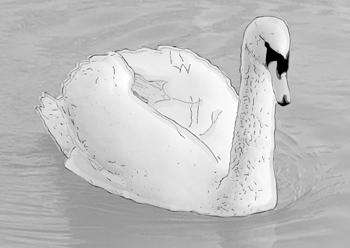
I live with my wife and our cute cat, Mr. Muffin, and one of my oldest friends, and his family. It's a bit uncommon to live in a house share but it's fun to have an extended "family," and I can only recommend it.
Interview
What first got you into writing?
One of the main reasons I became a journalist was in order to do something which involved writing. It was a bit like being an author, I told myself, as I've dreamt about becoming an author since I was a teen. In 2018, I finally found my courage and put some words on a page. In 2020, I published my first novel, The Doomsayer Prince, and since then, three other books have followed.
Some writers have trouble shifting from fiction to nonfiction, but you seem to do so fluidly. How do you do that?
That part is not hard. Just like I don't look out the window expecting to see Superman fly by, I make sure to keep what happens in the real world separate from the fantastic elements of fiction I create.
Or, almost 😊 I admit it would be much more difficult had I been writing political fiction! I'd be hard pressed to come up with any sort of story rivalling what we've witnessed in recent years on the international political scene. I'd bet you that had I published a book 20 years ago and filled it with stories from the newspapers from recent years, I'm sure readers and reviewers would have laughed and yelled, "this is crazy! Something this ridiculous will never happen!"
Just think about it … Brexit, a prime minister like Boris Johnson, a new, big war in Europe, Donald Trump becoming president, and a worldwide pandemic.
I'm glad I "just" write fantasy … I make stuff up in a way that people can believe and without reality interfering.
What are your writing goals?
I try to publish a book every year and of course sell as many copies as I can – which is hard.
If you want to support me, have a look at the reviews my books have gotten. I recommend the Doomsayer Prince, Omnibus Edition if it sounds like your kind of thing.
What is one of the things you are most thankful for as a writer?
I'm very fortunate that some of the people I already knew not only obliged to be my alpha/beta-readers but that they're actually good at it.
What's the most interesting book you've ever read?
Wow, that's a hard question.
Perhaps The Clan of the Cave Bear by Jean Marie Auel. I remember being fascinated by the ancient world she portrayed.
I also really like Rejsen mod Europa, written by Danish historian Jakob Danneskiold-Samsøe. It covers no less than 10.000 years of European history. But it's not translated to English, sorry ….
What book are you currently reading?
Who are your favorite authors?
Robert Jordan and J. R. R. Tolkien. There are many fantastic writers out there today, but the impact those two had on a younger me was profound.
What would your 8-year-old self think and say about you today?
Hopefully that I'm a nice guy. And for certain that I have a rather large nose which identifies me as part of my father's family, and I suspect that I'm extremely old. Not that I feel old, but kids just have different perspectives. Two minutes can seem like an eternity when you're little.
What do you like to do when you are not writing?
A few days ago, my wife and were selling books at a games and books convention called Nitricon in a different part of the country. My wife bought this bookmark which is totally how I do it.
A very fun day it was. I talked to so many happy fans of fantasy books, comics, games, cosplay, fantasy folk dancing, and other fabulous things. I always find that people who are into these sorts of things are just such nice people!
Also, I'm trying to get into better shape, I've begun to do some daily exercises and take longer walks around the lakes.
Where can we learn more about you?
At my Web site and social media. (See links above.)
I also do author interviews (more than 60 so far).
Tell us about your latest book. What do you hope readers take away from it?
It's the third book in my Artifact War Series titled Arch of the Zhi'el. I hope it makes readers think a bit about how quickly their life could end, potentially, and that it's important to cherish life and what you've got, and to try new things. Also, it gives the reader a deeper understanding of the main characters and hopefully they'll have a lot of fun reading it.
Oh, and the world is coming to an end.
The reader gets front seats to this, since one of the other main characters is Sulycan. He's the main bad guy and you get to be a part of his life where he intends to burn everything and everyone that doesn't submit.
Who is the perfect reader for your book? (Please do not say "everyone.")
If you read it and enjoy it, you're perfect.
I've talked to readers in their twenties who're really into the series. I'm not sure if it's particularly awesome for people that age or if they are better at letting me know.
And I've talked to some enthusiastic older readers who're just discovering (or rediscovering) fantasy. I think it appeal to them because my writing is straight forward. You don't need to read a lot of fantasy to understand what's going on.
What inspired the idea for the story?
For the series as a whole the initial inspiration was me being dissatisfied with the way magic works and how societies function in certain fantasy books and certain games. If you're interested, I wrote this article explaining it.
Plotwise the inspiration for the first book was me thinking about how to create a coherent hard magical system and a society in which this type of magic made sense.
Also, it's a world where new things are still being rediscovered more than a thousand years after the world was nearly destroyed in a magical cataclysm.
Extrapolation from these ideas I came up with a mage character, a kidnap plot, and a city protected by an ancient flying guardian. That was part of the first book Doomsayer Prince.
Specifically for the newest book, The Arch of the Zhi'el, various factions and nations continue to do battle over acquiring these newly discovered things and the main characters are in the middle of it all. The plot is inspired by how powerful these rediscovered artifacts really are, and how they, and some potent and ancient magical powers, impact not only our main characters but all the people around them.
How did you come up with the title for your book?
It's called The Arch of the Zhi'el. I totally get it if you don't understand the title but let me explain: the title and cover of each of the books in the Artifact War series are focused on only one of the main characters (they all appear in each of the books though.)
Emilai is on the cover of the new book. She is the daughter of a renowned knight and is a 17-year-old who's bright and compelling but rather sheltered. At the beginning of the first book she was betrothed, and her wedding date was swiftly approaching. She was expected to marry and bear children, and focus on that, but instead Emilai was kidnapped.
In the new book she's become The Arch of the Zhi'el and some of the chapters are focused on Emilai's world being turned upside down by this and on her figuring out her newfound magical powers. These include a sphinx, a magical voice in her mind which constantly gives her (often unwanted) advice.
Why not use a more understandable book title?
I just figure that few people will buy the third book in a series unless they are already reading the series … in which case they will likely understand the title … and so it's not a big issue.
You said it was her title, but what do the words mean precisely?
The Zhi'el are a group of ancient witches. Emilai finds herself thrust into being the leader of the Zhi'el and they call their leader the Arch.
Being the leader comes with certain perks like a very long life, immense magical powers, and a magical dress that can change shape to anything she wants. Fun for sure, but her life gets very difficult since witches are outlawed and anyone, she talks to are supposed to turn her in to the "magical police" or Magicstrates as they are called. They are all male and burn any witches they find.
If your book was made into a movie, which actors would play your characters?
The main characters in the Artifact War series are between 17 and 21 so I'd not want someone older to play them. Preferably I'd like young unknown actors with a lot of talent, like the cast of Stranger Things (before they did the first season.)
Please share a short excerpt from your book.
Tears formed in her eyes. It was hard to focus, and she blinked. By the spirit, she'd almost died. Had Emilai moved a little to her left, Pino wouldn't have been able to heal her. She wouldn't be alive.
'But he did, and you are.'
'I'm still not talking to you, sphinx. Not after what you did.'
'This is childish behavior.'
'Childish? This is your fault, sphinx!'
'No, Arch. Remember, you make the decisions — not I. An Arch of the Zhi'el must act like an adult.'
'What? I was stabbed and Milou almost hit the ground!'
'It's not the same thing.'
'Had we done things my way, she wouldn't even have been at risk.'
'You don't know that.'
'I faced that bald Ata'stux alone. You made me do it.'
'If you hadn't engaged the Warmage right then and there, he might have attacked you while you were saving First Luminary Milou.'
Emilai considered it. 'No, I still think I'm right.'
What role does research play in your writing? Do you have any research resources you recommend?
I Google a lot of stuff, and I've begun to use various AI chatbots to help me search for facts whenever Google can't find the answer I'm looking for. The AIs can sometimes dig up links to sources that Google doesn't find.
Do you aim for a set number of words/pages per day? Do you write every day, five days a week …?
In good periods I write seven days a week for a few hours. In bad periods I get little done, and close to deadline I write like there's no tomorrow.
Do you have an area set aside for writing?
I have a nice spot with a big glass door and windows which let me look out at all the flowers my wife plants in the garden. And a powerful PC which I use to write on, create my maps, covers and so on.
What does your writing process look like?
Usually, I write one 500–600-page book each year. I’ll spend three months creating the plot, then write as much before the summer holidays as I can and give the chapters to a few alpha-readers. I interview each of them for an hour (or three) and use their input to help me steer the rest of the book in an even more interesting direction than my initial ideas.
Then I use three kinds of editing software to help me fix typos and grammatical issues. I give the edited first draft to a few beta-readers, interview them, and use their ideas to change stuff that needs it.
I do another run through with the 3x editing software and pay a copy editor (who’s also an author) to help me polish the book into the final version.
What comes first, plot or characters? Why?
Not important, but whatever it is, it must be something I think is so great, I can't stop thinking about it.
For one of my books, the main characters, Prince Phytiax, was just supposed to be a minor character. But he ended up occupying my thoughts on a daily basis, and eventually he took over much of the book.
Also, I use my world building hack to make it easy for me to create new characters and plot elements that fit. (I'll get back to what the hack is shortly.)
Another important thing for me is that I like to think about the characters, like this: "What would a person with the same life goals, wants, and desires like a real person be like, if they had been born and lived in this utterly fantastical world I'm creating?"
Once I have the answer, I understand the characters much better, and I think of them as if they were real people.
Do you outline and plan your story or do you just sit down and write? Why?
I have written one book where I made everything up as I went along. This made it a lot easier to read the book for the reader, I think. The words really flow and it wrote itself much quicker than I'm used to. The characters are great, too. The downside is that the plot's messy and less exciting than in the other books. Stuff just fits less well together.
I usually create a very detailed plot before writing, though. I wrote an article about my usual process.
What is your most interesting writing quirk?
As I mentioned I use a world building hack. It goes like this:
I'll start with facts about this place I want to write about like "There are mages who can cast powerful spells." Which makes little sense in our world. But since this is a must for the story I want to write, I'll ponder how such a thing could be possible.Perhaps magic is some form of technology or maybe the natural laws are different. Whatever it is I try to come up with something completely new and interesting.
Once I understand the world/universe better, I'll extrapolate the world building from there and figure out the setting and all the rest.
In essence, I create a theory about a different world. So, like you Bill, I create worlds which are not quite like ours.
A fun thought is that physicists have theorized that there could be an infinite number of universes out there, some with very different natural laws, and some more similar to ours. Maybe my creations really exist out there in the infinite. Who knows 😊
How important are names to you in your books? Do you choose the names based on liking the way it sounds or the meaning?
I have drawn a lot of inspiration from ancient Celtic and Greek names. I really love those. However, this does tend to make for some rather difficult-to-pronounce names such as my main character Phytiax. I likely use too many fantasy-sounding names and would be better to call them Harry or Sam … I just love the fantastical.
What software do you use to write? Or do you prefer to write longhand or dictate your work? Why?
I use MS Word and MS Notepad to write. I always have a physical notebook nearby just in case I get an idea when I'm in bed or away from home. I also use editor software like, for instance, ProWritingAid to help me with spelling/grammar.
How do you celebrate when you finish writing a book?
My wife immediately asks me, "Where is the next book in the series done? I want to read it now!"
I guess, I'll celebrate when the series is done, ha-ha. Publishing day is just another "glorious day" in the life of a self-published author.
No, seriously, while I don't do much celebrating, I do take some time off before I do the final layout, cover creation, marketing and so on.
In your opinion, what's the measure of a successful writer?
Whatever makes you happy about your writing, marketing, or something else writer related is what success is to you.
To illustrate the huge difference, I talked to a new writer last weekend who was absolutely ecstatic after selling six books at a convention. He was smiling sooo wide. I could see it was the best feeling ever for him.
But I've interviewed authors who've sold millions of copies and they don't seem that fulfilled by this. They are very keen on us buying their books, though. So, I definitely get how disciplined, and laser focused they are.
What success looks like to you is a very personal thing and depends on your personal goals and dreams.
What is the best advice you could give other writers about writing?
Do what feels right, but don't forget to push against your boundaries. To grow you need to try new things. Learn new lessons.
What's your favorite and least favorite part of publishing?
One of the reasons I love self-publishing is because I'm in control of everything from text to layout and cover. Whenever I want to upload a new book on Amazon (or someplace else) it'll be online within hours for people to purchase.
I dislike the stuff you can't control. Two months ago, I found out that Amazon was still selling one of my books with the old version of the cover and without the changes I'd uploaded more than a month prior.
To make matters much worse, they still haven't fixed the issue, and the weekly status updates the supporters send have been saying the same for the last month. I really hope Amazon fixes the issue soon!
What is the best advice you could give other writers about publishing?
Do it because you want to write books. Not because you expect to get rich or famous. Each month Amazon publishes 50,000 new titles. The market is not only saturated with books. It's drowning in them. So, don't expect to earn a living from being an author (self-published or traditionally published.)
Try your best and see how far you can get, and if you do make a living from it know that you're one of the few success stories in an ocean of good writers that don't.
How do you market or promote your books (e.g. social media, e-mail, blog tours, etc.)?
Mostly via social media. I have an e-mail newsletter, and do some group promos. I sell books at conventions. Contact reviewers and participate in competitions.
What strategies have demonstrated the most success for you?
Over time, social media. Group promos are also fine, but they are often focused on free or discounted books, so they give volume but not much revenue. I don't do them often.
Conventions are interesting because you sell physical books which earn you a lot more than eBooks and Audiobooks. However, there aren't that many in my country, some are a complete waste of time, and your profit is severely hampered by the stall fee, transportation, and accommodations.

Writing Advice: Writing a Story
Writing Advice: Choosing Your Narrative
Author Interview: Nicolas Lemieux
Author Interview: Clay Vermulm
Author Interview: Jasveer Singh Dangi
Author Interview: Uchechi Theresa Ezeuko
Author Interview: David Andrew Trotter
